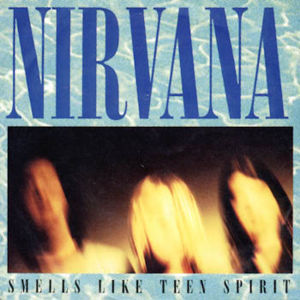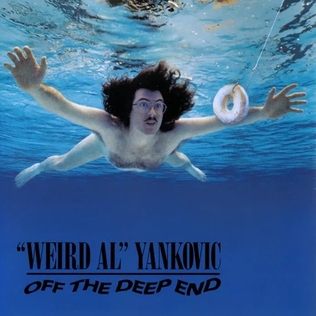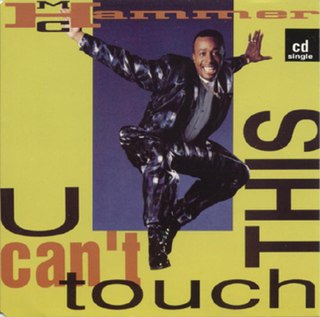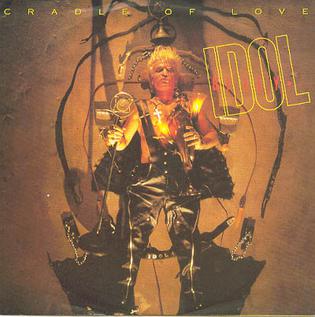
"Smells Like Teen Spirit" is a song by the American rock band Nirvana. It is the opening track and lead single from the band's second album, Nevermind (1991), released on DGC Records. The unexpected success of the song propelled Nevermind to the top of several albums charts at the start of 1992, an event often marked as the point when grunge entered the mainstream. It was Nirvana's biggest hit, charting high on music industry charts around the world in 1991 and 1992, and was number one on the charts in Belgium, France, New Zealand and Spain. It was met with wide critical acclaim, and described as an "anthem for apathetic kids" of Generation X. Although Nirvana grew uncomfortable with the mainstream and commercial attention the song brought to them, listeners and critics continue to praise "Smells Like Teen Spirit" as one of the greatest songs of all time.

Off the Deep End is the seventh studio album by the American parody musician "Weird Al" Yankovic, released in 1992. This album was the first album self-produced by Yankovic, after six albums with Rick Derringer. Recorded between June 1990 and January 1992, the album was a follow-up to the unsuccessful soundtrack to Yankovic's 1989 film UHF. Off the Deep End and its lead single "Smells Like Nirvana" helped to revitalize Yankovic's career after a lull following his last hit single, "Fat", in 1988.

"Eat It" is a 1984 song by American comedy music artist "Weird Al" Yankovic. It is a parody of Michael Jackson's 1983 single "Beat It", with the contents changed to be about an exasperated parent attempting to get their picky child to eat anything at all, much less to eat properly. The track was both a commercial and critical success, earning Yankovic a Grammy Award. It peaked at number twelve in the United States, making it his first top 40 hit in that country, and reached number one in Australia.

"Gangsta's Paradise" is a single by American rapper Coolio, released on August 1, 1995 by Tommy Boy, Warner Bros. and MCA. Interpolating Stevie Wonder's song "Pastime Paradise" (1976), "Gangsta's Paradise" features vocals from American singer L.V. who served as a co-composer and co-lyricist with Coolio and Doug Rasheed, with Wonder also being credited for the composition and lyrics. Certified Platinum in October, the song was included on Coolio's second album, Gangsta's Paradise, in November 1995. Its music video was directed by Antoine Fuqua and featured Michelle Pfeiffer. The song is taken from Pfeiffer's movie Dangerous Minds, and the music video is also themed around the movie.

"Black Hole Sun" is a song by American rock band Soundgarden. Written by frontman Chris Cornell, the song was released in 1994 by A&M Records as the third single from the band's fourth studio album, Superunknown (1994). Considered to be the band's signature song, it topped the US Billboard Album Rock Tracks chart, where it spent a total of seven weeks at number one. Despite peaking at number two on the Billboard Modern Rock Tracks chart, "Black Hole Sun" finished as the number-one track of 1994 for that listing. Worldwide, the single reached the top 10 in Australia, Canada, France, and Ireland, while in Iceland, it reached number one.

"Closer" is a song by American industrial rock band Nine Inch Nails, released as the second single on their second studio album, The Downward Spiral (1994). Released in May 1994, it is considered one of Nine Inch Nails' signature songs and remains their most popular song. Most versions of the single are titled "Closer to God", a rare example in music of a single's title differing from the title of its A-side. The single is the ninth official Nine Inch Nails release, making it "Halo 9" in the band's official Halo numbering system.

"Basket Case" is a song by rock band Green Day, released on August 1, 1994 by Reprise Records as the second single from the band's third studio album, Dookie (1994). The song spent five weeks at the top of the US Billboard Alternative Songs chart and garnered a Grammy Award nomination in the category for Best Rock Vocal Performance by a Duo or Group. Its music video was directed by Mark Kohr and filmed in an abandoned mental institution in California. In 2001, the song appeared on their greatest hits album International Superhits!. In 2021, "Basket Case" was ranked number 150 in Rolling Stone's updated list of the "500 Greatest Songs of All Time".

"Ice Ice Baby" is the debut single by American rapper Vanilla Ice, K. Kennedy and DJ Earthquake. It samples the bassline of the song "Under Pressure" by British rock band Queen and British singer David Bowie, who did not receive songwriting credit or royalties until after it had become a hit. Released on Vanilla Ice's debut album, To the Extreme (1990), it is his best-known song. It has appeared in remixed form on Platinum Underground and Vanilla Ice Is Back! A live version appears on the album Extremely Live, while a nu metal version appears on the album Hard to Swallow, under the title "Too Cold".

Gerardo Mejía, better known by his mononym Gerardo, is an Ecuadorian-born American singer, rapper and actor. He gained wide visibility with a 1990s hit song "Rico Suave", and later became a recording industry executive, and a Christian pastor.

"U Can't Touch This" is a song co-written, produced, and performed by American rapper MC Hammer. It was released as the third single from his third album, Please Hammer Don't Hurt 'Em (1990), and has been considered his signature song. Along with Hammer, Rick James shares songwriting credits with Alonzo Miller, as the song samples the prominent opening riff of James' 1981 single "Super Freak". The song has been used and referred to in many television shows, films, commercials, and other forms of media. It has also received multiple awards and recognition.

"The Humpty Dance" is a song by the American hip-hop group Digital Underground from their debut album Sex Packets. Released as the second single from the album in January 1990, it reached No. 11 on the pop chart, No. 7 on the R&B chart, and No. 1 on the Billboard Rap Singles chart. The song is sung by Shock G's alter ego, "Humpty Hump", marking the character's second musical appearance; the first was Digital Underground's "Doowutchyalike," a pre-album video-single released in the spring of 1989. The song has been sampled by many different artists and producers.

"Black or White" is a song by the American singer Michael Jackson, released by Epic Records on November 11, 1991, as the first single from Jackson's eighth studio album, Dangerous (1991). Jackson wrote, composed, and produced it with Bill Bottrell. Epic Records described it as "a rock 'n' roll dance song about racial harmony".

"Achy Breaky Heart" is a song written in 1990 by Don Von Tress. First released in 1991 by the Marcy Brothers with the title "Don't Tell My Heart", it was later recorded by American singer and actor Billy Ray Cyrus and released on his debut album, Some Gave All (1992). The song is Cyrus's debut single and signature song. It became the first single ever to achieve triple platinum status in Australia and also 1992's best-selling single in the same country. In the United States, it became a crossover hit on pop and country radio, peaking at No. 4 on the Billboard Hot 100 and topping the Hot Country Songs chart, becoming the first country single to be certified platinum since "Islands in the Stream" by Kenny Rogers and Dolly Parton in 1983. The single topped in several countries, and after being featured on Top of the Pops in the United Kingdom, peaked at No. 3 on the UK Singles Chart. It was Cyrus's biggest hit single in the U.S. until he was featured on "Old Town Road" by rapper Lil Nas X, which peaked at No. 1 on the Billboard Hot 100 27 years later.

"Come on Over Baby (All I Want Is You)" is a song recorded by American singer Christina Aguilera for her 1999 self-titled debut studio album. Released as the album's fourth and final single on July 11, 2000, by RCA Records, it was the first song over which Aguilera was given significant creative control. "Come on Over Baby (All I Want Is You)" was written by Johan Åberg and Paul Rein, with Aguilera, Ron Fair, Chaka Blackmon, Raymond Cham, Eric Dawkins, Shelly Peiken and Guy Roche contributing to a re-recorded version. The album version of the song was produced by Aaron Zigman, Åberg and Rein, while the re-recorded version was produced by Fair and Celebrity Status.

"Hungry Like the Wolf" is a song by English new wave band Duran Duran. Written by the band members, the song was produced by Colin Thurston for the group's second studio album, Rio (1982). The song was released on 4 May 1982 as the band's fifth single in the United Kingdom, and 8 June 1982 in the United States. It reached No. 5 on the UK Singles Chart, and received a platinum certification from the British Phonographic Industry (BPI).

"Unbelievable" is a song written and recorded by British band EMF, originally appearing on their debut album, Schubert Dip (1991). It was released as a single in the UK in October 1990 by Parlophone, peaking at number three on the UK Singles Chart on 1 December 1990. It was the 30th-best-selling single of 1990 in the UK, and a top 10 hit also in Belgium, Germany, Ireland, the Netherlands, Norway, Spain and Sweden. In the United States, "Unbelievable" hit number one on the Billboard Hot 100 and Cash Box Top 100 in 1991. The song was produced by Ralph Jezzard, and contains samples of US comedian Andrew Dice Clay and a Black Panther Party member shouting "What the fuck?" Its music video was directed by Josh Taft.

"White & Nerdy" is the second single from "Weird Al" Yankovic's album Straight Outta Lynwood, which was released on September 26, 2006. It parodies the song "Ridin'" by Chamillionaire and Krayzie Bone. The song both satirizes and celebrates nerd culture, as recited by the subject, who cannot "roll with the gangstas" because he is "just too white and nerdy". It includes many references to activities stereotypically associated with nerds and/or white people, such as collecting comic books and action figures, being fluent in JavaScript and Klingon, editing Wikipedia, and playing Dungeons & Dragons.

The discography of American singer, songwriter, musician, record producer, actor and parodist "Weird Al" Yankovic consists of fourteen studio albums, two soundtrack albums, nine compilation albums, eleven video albums, two extended plays, two box sets, forty-six singles and fifty-four music videos. Since the debut of his first comedy song in 1976, he has sold more than 12 million albums—more than any other comedy act in history—recorded more than 150 parody and original songs, and performed more than 1,000 live shows. His works have earned him five Grammy Awards among sixteen nominations, along with several gold and platinum record certifications in the United States. Yankovic's first single, "My Bologna", was released in 1979, and he made his chart debut two years later with his second single, "Another One Rides the Bus", which peaked at number four on the Billboard Bubbling Under Hot 100 Singles chart. His self-titled debut studio album was released on Scotti Brothers Records on May 3, 1983, peaking at number 16 on the US Billboard 200 and being certified gold by the Recording Industry Association of America (RIAA). "Ricky", the album's third single, became his first single to chart on the US Billboard Hot 100, peaking at number 64.

"Cradle of Love" is a rock song written by Billy Idol and David Werner for Idol's 1990 fourth studio album Charmed Life. The song is the album's sixth track and was released as its first single. "Cradle of Love" became Idol's last top-10 hit in the United States, where it reached No. 2 on the Billboard Hot 100. It was also Idol's first and only No. 1 hit on the Billboard Mainstream Rock Tracks chart. On the UK Single Chart, it stalled at No. 34.

Mo' Ritmo is the first album by the Ecuadorian-born American Gerardo. Released in 1991 by Interscope Records as the label's inaugural album, it peaked at No. 36 on the Billboard 200.



















